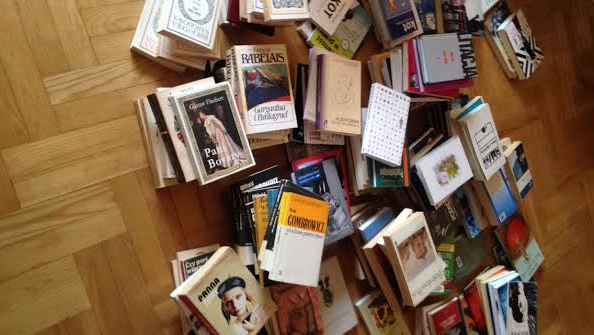Wiecie jak to jest. Żyjemy w przekonaniu, że wszystko będzie zawsze tak samo. Dzieci będą małe, koty będą wskakiwać na parapet, codziennie będziemy wstawać rano do pracy, nienawidzieć poniedziałków, będziemy snuć domysły, czy czeka nas jakaś nowa miłość, coś lepszego, coś smaczniejszego, coś bardziej ekscytującego, aż któregoś dnia…
Pierwsze symptomy są nieznaczne: kace trwają dłużej niż zazwyczaj, każda dodatkowa lub późnonocna aktywność wymaga potem większego nakładu snu i odpoczynku, siły słabną wolno, ale konsekwentnie. Coraz bardziej atrakcyjna wydaje się zwykła cisza. Entuzjazm staje się towarem tak deficytowym jak szynka w PRL-u. Nadchodzi wiek i czas, kiedy zaczynamy uświadamiać sobie własną śmiertelność, skończoność, jakiś termin przydatności, ale nie wiadomo jaki.
Ale póki co ten temat nadal nie istnieje, nie jest modny i nie mieści się w trendzie stay positive.
Mnie czasem nachodzą takie myśli, zupełnie jakby znienacka, ale kiedyś przecież nie przyszłyby mi do głowy, o tym co się stanie z milionem moich zdjęć w chmurach googla, czy appla, czy facebooka, co w kontami społecznościowymi i bankowymi, czy ktoś usunie ten mój ślad na serwerach i zrobi miejsce kolejnym? Kto się tym zajmie, czy mam dużo rzeczy w domu? Kto się nimi zajmie? Tu już jakiś czas temu wpadłam na pomysł, że mam wszystkiego za dużo. Od jakichś 3 lat używam tylko tego co mi jest potrzebne, więc mój ślad węglowy nie powinien być mega kłopotliwy dla tych, co jeszcze będą żyli, kiedy ja już nie. Czasem dobrze niemalże nic nie mieć.
I o tym między innymi jest właśnie komiks rysowniczki New Yorkera Roz Chast „Porozmawiajmy o czymś przyjemniejszym”: o porządkowaniu rzeczy, jest rozmową z nami o tym, co udajemy, że nas nie dotyczy, co postrzegamy jako nieprzyjemne, dołujące i coś co zdarza się tylko innym, czyli o starości i o śmierci.
To ciekawe, że powstał szereg bardzo mocnych i przejmujących utworów na temat rozliczeń z dzieciństwem, rodziną, rodzicami. I ciekawe, że rozliczenie to odbyło się w komiksowej formie, tak jakby niepoważna forma obrazka pozwoliła zaprzęgnąć w narrację poczucie humoru, a tym samym oswoić trudne, często traumatyczne przeżycia. Rozprawiali się z tymi tematami Wanda Hagendorn w „Totalnej nienostalgii” , Wojtek Wawszczyk w „Panu Żarówce”, Manu Larcenet w „Codziennej walce”, o czym pisałam. To są mocne komiksowe dzieła, tak zwane rozliczeniowe, które w bezpretensjonalny, ale wielce sugestywny sposób unaoczniają nam też nasze własne zaprzeszłe echa emocji, które być może my chowamy w szafie jak trupy.
Roz Chast próbuje tym razem wydobyć na wierzch coś więcej, nie tylko rozrachunek z rodzicami, chce pokazać, czym jest starość, umieranie i porządkowanie rzeczy po tych co odeszli, bez smrodku patosu, łez, oskarżeń czy fałszywych egzaltacji.
Niezależnie od dawki czarnego humoru jaką Chast zawarła w tym komiksie, nie jest to lektura łatwa ani przyjemna.
Autorka rysuje, opisuje ostatnie lata życia swoich rodziców, którzy żyli długo, bo ponad 90 lat i z tego opisu nie wyłania się idylliczny obrazek, na którym prawie stuletnim dziadziom wnuczęta przynoszą torty z imponującymi cyframi zatkniętymi w lukier. Nie ma tu też martyrologii. Jest za to dużo ludzkiego zmagania z poczuciem winy Chast jako córki oraz wyrazista refleksja, że tak jak koszt życia bywa dość wysoki, tak zaprawdę powiadam wam, starość i umieranie to są koszty wręcz niebotyczne. Moment, w którym Chast obserwuje powolne gaśnięcie 97 letniej matki i z prędkością światła topniejące środki na utrzymanie opiekunek, pielęgniarek, hospicjów, domów starców, pieluchomajtek, lekarstw itd. – jest najbardziej koszmarnym momentem w trakcie lektury, bo odziera czytelnika w sposób prosty i bezpretensjonalny z mniemania, że jego życie jest takie strasznie wyjątkowe i cenne i pełne godności. Otóż prawda jest taka, że nie jest.
Brzmi to szaleńczo i obrazoburczo, bo w trakcie życia trudno nam się godzić z myślą, że niewiele w gruncie rzeczy znaczymy. Wydaje nam się, owszem, że nasza egzystencja jest wyjątkowa, jesteśmy nie do zastąpienia i ogólnie dusze towarzystwa z nas, ale w istocie nie jest to prawdą. Okazujemy się nieprzydatni, nawet socjalnie, towarzysko – jesteśmy obiektami, na widok których młodsi ludzie odwracają wzrok i dyskutują na przyjemniejsze tematy, i jesteśmy obiektami, które po prostu dużo kosztują, nie tylko pieniędzy.
Dlatego komiks Chast jest trudny. Porusza w nas struny, które chcemy pozostawiać w uśpieniu. Nie grają one w orkiestrze codzienności, nie wspomnę o solówkach. Ciężko godzić się z faktem, że bardzo brzydko znikamy.
Znamienny w komiksie był fragment, kiedy Roz namówiła rodziców, aby przenieśli się do domu opieki. Byli przekonani, że kiedyś wrócą jeszcze do swojego zagraconego mieszkania na Brooklynie, ale okazało się, że wyszli z niego i nigdy potem już nie wrócili. A wyszli każde z jedną małą walizką, z rzeczami niezbędnymi do bycia w nowym miejscu. Okazało się, że wszystko co nagromadzili w ciągu życia, blendery z lat 50 tych, książeczki czekowe z lat 60, zeszyty dziecka z podstawówki, pokrywki do słoików itd itpt. nie okazały się tak niezbędne jak przypuszczali. Ja osobiście nie jestem zbieraczem, ale ten obrazek na pewno dobrze ilustruje nasz ogólnoludzki pęd do gromadzenia, posiadania. Ale nikt nie wie po co gromadzi i co z tego wynika prócz zagracania i kłopotów dla spadkobierców.
Dość istotny moim zdaniem jest też tu wątek o stosunkach jedynaczki Roz z jej rodzicami. Otóż bez zbędnego mizdrzenia się autorka pokazuje, że nie jest oczywiste, że dzieci i rodzice się lubią. Chast nie ukrywała, że jej największym marzeniem była wyprowadzka z domu apodyktycznej matki, której się bała i ojca pantoflarza, a potem opieka nad nimi nie czyniła z niej w jej mniemaniu gwiazdy miłosierdzia, była to zwyczajna droga przez mękę z ludźmi, którzy najbardziej lubili być sami we dwoje, mieli dziwactwa i oczywiście zawsze wszystko wiedzieli lepiej, nawet, kiedy topniał ich umysł. Ale swoje przemyślenia na temat tych urazów, niespełnień, pretensji Chast podaje lekko, w sposób lekko przyswajalny.
Podsumowując – jest to bardzo życiowy – sic! – komiks, o tym, że wyrugowana z życia popkultury śmierć jest jego nieodłączną i szalenie trudną częścią, tak samo przemijanie, odchodzenie i gaśnięcie, i że właściwie w całym tym kontekście śmierć bywa naprawdę wybawieniem. Jest podanym z wielką klasą rozrachunkiem z trudnym dorastaniem i trudnymi rodzicami, z poczuciem nie bycia kochanym i rozumianym tak jak by się chciało, ale mimo tego z ogromnym zrozumieniem dla odchodzenia w niebyt bliskich z mocnym podkreśleniem na czerwono, że nie jest to kurwa łatwe. Dla żadnej ze stron, ani tej, która ma odejść, ani tej, która jeszcze zostaje.
Myślę, że gdyby ktoś po lekturze komiksu zechciał napisać testament – to wcale nie byłby taki głupi pomysł, a w nim zapytanie, czy odpowiedzi na pytania po co się żyło, jak się zyło, po co coś się robilo, pozostawiać do rozwikłania potomnym i czy nie lepiej rozliczać się z tym każdego dnia.













